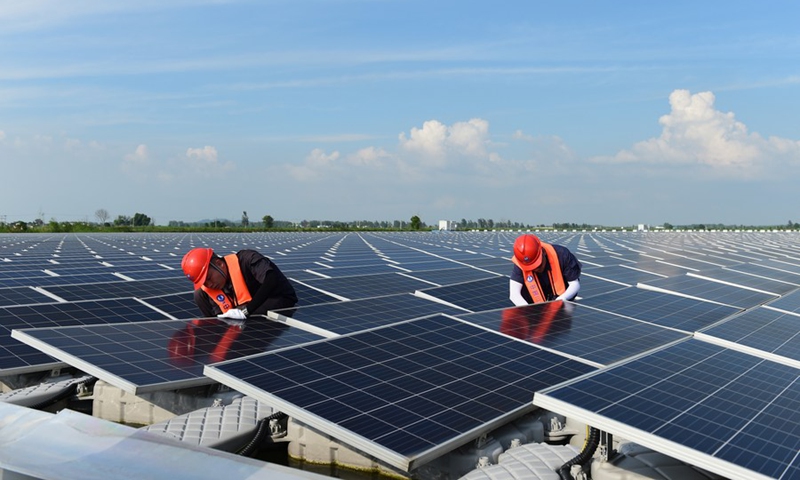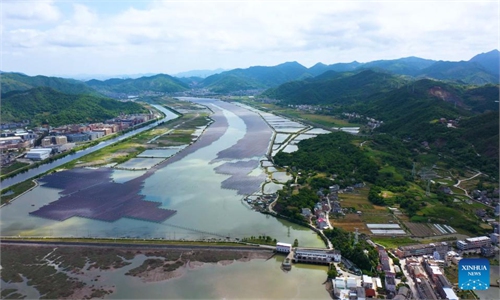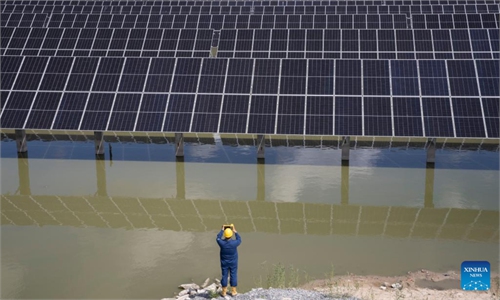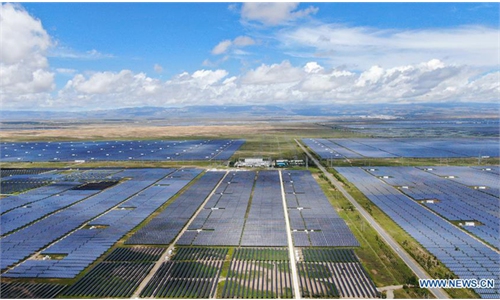The US shoots itself in the foot with sanctions against Chinese PV products: industry insider

Engineers conduct maintenance work at a floating solar farm in Panji District of Huainan City, east China's Anhui Province, July 20, 2021. Photo: Xinhua
Chinese photovoltaic (PV) industry players remain resilient and competitive in both the US and in global terms despite the relentless sanctions from the US in an ill-intended move to strangle Chinese products, which have made a significant contribution to the green development of the country at a fairly low costs, and to replace them with high cost and less competitive US-made ones, industry insiders said.
Speaking about the 2022 China International Fair for Trade in Services (CIFTIS) in Beijing, several domestic PV industry players told the Global Times that they are not worried about the US sanctions as their products have won popularity in terms of costs, quality, production capacity and reliable self-developed technology, not only in the US but worldwide.
The staff with Trina Solar, a domestic leading solar energy solution provider, told the Global Times that China's overall manufacturing level of solar photovoltaic products is top-notch in the world, with the company's battery efficiency having achieved the world record a mind-boggling 25 times.
There is currently no way for the US to prevent the use of Chinese products.
The staff of Yingli Group also told reporters that "The general trend of globalization is irreversible." At present, the US has no way to completely rely on its own industrial supply chain to meet market demand, industry insiders said.
When the US decided in March to launch an investigation into Southeast Asia, the US domestic market, which is highly dependent on Southeast Asian products, immediately felt the impact. However, three months later, the US decided to grant a 24-month tariff exemption for solar panels from four Southeast Asian countries as media reported.
The US PV industry has been shaken, 318 photovoltaic projects have already been canceled or delayed, according to the media hundreds of companies are considering layoffs, , which industry insiders said is a reflection of the inadequacy of its own production capabilities and a sign that the US is highly dependent on Chinese products.
The US is now using a fiscal stimulus in the just-introduced Inflation Reduction Act to boost the domestic production of clean energy such as solar modules.
However, the bill also states that the production of manufacturers enjoying financial subsidies must be assembled in North America and battery materials and "critical minerals" must come from the US or from countries with a free trade agreement with the US.
The US attitude toward Chinese PV products is a mixture of "love and hate," an employee with Ying Li Group told the Global Times, noting that while the US wants to decouple with China, the industry group of the US cannot.
The data shows that at present, China's solar photovoltaic module production accounts for more than three fourths of the world's total, and its cumulative installed capacity ranks first in the world.
Moreover, the demand in overseas markets continues to be strong, and the export value of Chinese products has reached new heights.
In contrast, the US solar photovoltaic module shipments are mainly imported. According to the country's Energy Information Administration, which revealed that 2021 module shipments increased 32 percent year-on-year to a record generating capacity of 28.8GW, media reported.
About 80 percent of the module shipments last year were imports, mainly from Asia, with 49 percent coming from China.
Additionally, more than half of the PV module shipments to the US are from China or overseas factories by Chinese companies, industry insiders said.
A staff member from Yingli Group told the Global Times that China's PV industry is leading the worlds in technology research and development, manufacturing and industry applications.
China's strong production and supporting capabilities also make the price of Chinese products highly competitive, even when including US-imposed tariffs, the employee said. The insider said that the US' own policy is just a way in which the US is'shooting itself in the foot.'
Chinese companies are also diversifying their markets to reduce the dependence on any single market, which includes the US, an important export market for some Chinese firms.
Although the US is a traditional market for solar photovoltaic products, policy risks in the US market still exist, and Chinese companies have to be vigilant at all times, an industry insider said.
The Yingli Group's staff member explained that with the advancement of China's Belt and Road Initiative, a broader global market has been opened and the company no longer "relies on" the US market.



